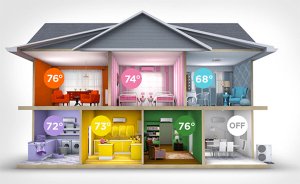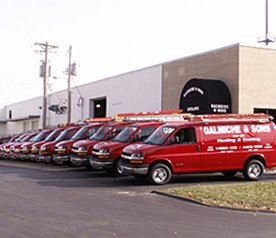
HVAC zoning systems are one of the greatest ways homeowners can reduce their energy usage and make their HVAC systems work less with more efficiency. There are a great many advantages that come with making HVAC zoning systems a part of your home comfort, with a few drawbacks as well. In this article, we explore the basics of HVAC zoning systems and what they could mean for your home.
If you are in the market for an HVAC zoning system installation in your home in St. Louis or the surrounding area, contact the heating & air conditioning experts at Galmiche & Sons. We are happy to talk to you about all your options to help you determine whether an HVAC zoning system makes sense as a tool in your home’s heating and cooling comfort.
Using HVAC Zoning Systems to Enhance Your Home’s Heating & Cooling Comfort
The traditional use of an HVAC system often means a fairly significant waste of energy except for those that are particularly judicious with their thermostats. HVAC systems tend to have one focus, and that is to heat or cool an entire house. However, what is the sense in treating a whole house when only part of it may be occupied or in use? Wasting energy to heat or cool empty rooms also means a waste of money and frustration when that monthly energy bill arrives in the mailbox. In an effort to be more energy-conscious, many St. Louis families are opting for HVAC zoning systems in their homes, allowing them to separate or section out different areas of their house to fall under different temperature controls.
While an HVAC zoning system may not make sense for every home, homes that fall within these specifications would do well:
- Multi-level homes
- Homes with rooms that are not often used or not at all used
- Uneven ceiling heights (ex. Homes with a vaulted ceiling in one room)
- Sprawling ranch homes
- Families who normally duke it out over the thermostat settings
- Home with windows that are unevenly spaced or are different sizes
If your home falls into any of these categories, your HVAC system may be fighting a bit of an uphill battle in trying to evenly heat or cool your home. This is where a zoning system could make a big difference to your home comfort level as well as your monthly energy bills.
Pros & Cons of HVAC Zoning
Like everything in life, HVAC zoning systems certainly come with their benefits. However, there are some drawbacks to consider as well.

Pros:
- Comfort and control – These systems give you the opportunity to set different temperatures for different areas of the house, so you do not find all your heat rising to the top of the high ceilings of your living room, or you are not cooling the guest bedroom that no one is staying in at the moment.
- Reduced energy use – Because you can allow your HVAC system to shift focus to specific areas of the home rather than trying to heat or cool its entirety, you can see a reduction in otherwise wasted energy use. Good for the environment, and your monthly budget.
Cons:
- Installation costs – Unless you are on the brink of a new home build or getting a new HVAC system anyway, installing a zonal system can be a bit costly. While your monthly energy bills should decrease, you will have to prepare to invest a fairly sizeable chunk of change upfront.
- Difficulty troubleshooting – Because of the added complexity of the zonal system, sometimes diagnosing the cause and area of a breakdown can be more difficult than a traditional system.
Many families that enjoy zoning systems in their homes are happy they took the step. While there are a lot of things to consider when it comes to deciding if one is worthwhile for your home, at Galmiche & Sons we have a lot of industry knowledge and can answer any questions or concerns you might have.
Learn More About HVAC Zoning Systems
For more information about HVAC zoning systems, give Galmiche & Sons a call. We are experts in St. Louis’ heating & air conditioning needs and are happy to have a discussion with you about yours.












